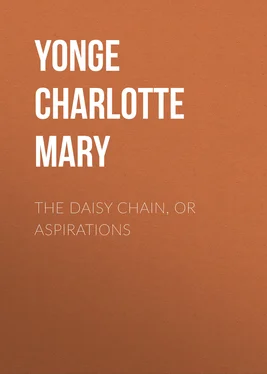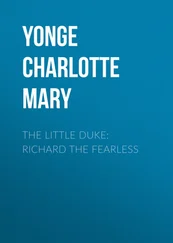Charlotte Yonge - The Daisy Chain, or Aspirations
Здесь есть возможность читать онлайн «Charlotte Yonge - The Daisy Chain, or Aspirations» — ознакомительный отрывок электронной книги совершенно бесплатно, а после прочтения отрывка купить полную версию. В некоторых случаях можно слушать аудио, скачать через торрент в формате fb2 и присутствует краткое содержание. Жанр: foreign_prose, literature_19, Европейская старинная литература, foreign_antique, на английском языке. Описание произведения, (предисловие) а так же отзывы посетителей доступны на портале библиотеки ЛибКат.
- Название:The Daisy Chain, or Aspirations
- Автор:
- Жанр:
- Год:неизвестен
- ISBN:нет данных
- Рейтинг книги:5 / 5. Голосов: 1
-
Избранное:Добавить в избранное
- Отзывы:
-
Ваша оценка:
- 100
- 1
- 2
- 3
- 4
- 5
The Daisy Chain, or Aspirations: краткое содержание, описание и аннотация
Предлагаем к чтению аннотацию, описание, краткое содержание или предисловие (зависит от того, что написал сам автор книги «The Daisy Chain, or Aspirations»). Если вы не нашли необходимую информацию о книге — напишите в комментариях, мы постараемся отыскать её.
The Daisy Chain, or Aspirations — читать онлайн ознакомительный отрывок
Ниже представлен текст книги, разбитый по страницам. Система сохранения места последней прочитанной страницы, позволяет с удобством читать онлайн бесплатно книгу «The Daisy Chain, or Aspirations», без необходимости каждый раз заново искать на чём Вы остановились. Поставьте закладку, и сможете в любой момент перейти на страницу, на которой закончили чтение.
Интервал:
Закладка:
In a moment he was at her door. “Oh! Norman, come in. Is it time?”
“I should think so! You’re keeping every one waiting.”
“Oh, dear! go on; only just tell me the past participle of ‘offero’, and I’ll catch you up.”
“‘Oblatus.’”
“Oh, yes, how stupid. The ‘a’ long or short? Then that’s right. I had such a line in my head, I was forced to write it down. Is not it a capital subject this time?”
“The devotion of Decius? Capital. Let me see!” said Norman, taking up a paper scribbled in pencil, with Latin verses. “Oh, you have taken up quite a different line from mine. I began with Mount Vesuvius spouting lava like anything.”
“But Mount Vesuvius didn’t spout till it overthrew Pompeii.”
“Murder!” cried Norman, “I forgot! It’s lucky you put me in mind. I must make a fresh beginning. There go my six best lines! However, it was an uncanny place, fit for hobgoblins, and shades, and funny customers, which will do as well for my purpose. Ha! that’s grand about its being so much better than the vana gloria triumphalis—only take care of the scanning there—”
“If it was but English. Something like this:
“For what is equal to the fame
Of forgetting self in the aim?
That’s not right, but—”
“Ethel, Norman, what are you about?” cried Flora. “Do you mean to go to Cocksmoor to-day?”
“Oh, yes!” cried Ethel, flying into vehement activity; “only I’ve lost my blue-edged handkerchief—Flora, have you seen it?”
“No; but here is your red scarf.”
“Thank you, there is a good Flora. And oh! I finished a frock all but two stitches. Where is it gone? Go on, all of you, I’ll overtake you:
“Purer than breath of earthly fame,
Is losing self in a glorious aim.
“Is that better, Norman?”
“You’ll drive us out of patience,” said Flora, tying the handkerchief round Ethel’s throat, and pulling out the fingers of her gloves, which, of course, were inside out; “are you ready?”
“Oh, my frock! my frock! There ‘tis—three stitches—go on, and I’ll come,” said Ethel, seizing a needle, and sewing vehemently at a little pink frock. “Go on, Miss Winter goes slowly up the hill, and I’ll overtake you.”
“Come, Norman, then; it is the only way to make her come at all.”
“I shall wait for her,” said Norman. “Go on, Flora, we shall catch you up in no time;” and, as Flora went, he continued, “Never mind your aims and fames and trumpery English rhymes. Your verses will be much the best, Ethel; I only went on a little about Mount Vesuvius and the landscape, as Alan described it the other day, and Decius taking a last look, knowing he was to die. I made him beg his horse’s pardon, and say how they will both be remembered, and their self-devotion would inspire Romans to all posterity, and shout with a noble voice!” said Norman, repeating some of his lines, correcting them as he proceeded.
“Oh! yes; but oh, dear, I’ve done! Come along,” said Ethel, crumpling her work into a bundle, and snatching up her gloves; then, as they ran downstairs, and emerged into the street, “It is a famous subject.”
“Yes, you have made a capital beginning. If you won’t break down somewhere, as you always do, with some frightful false quantity, that you would get an imposition for, if you were a boy. I wish you were. I should like to see old Hoxton’s face, if you were to show him up some of these verses.”
“I’ll tell you what, Norman, if I was you, I would not make Decius flatter himself with the fame he was to get—it is too like the stuff every one talks in stupid books. I want him to say—Rome—my country—the eagles—must win, if they do—never mind what becomes of me.”
“But why should he not like to get the credit of it, as he did? Fame and glory—they are the spirit of life, the reward of such a death.”
“Oh, no, no,” said Ethel. “Fame is coarse and vulgar—blinder than ever they draw Love or Fortune—she is only a personified newspaper, trumpeting out all that is extraordinary, without minding whether it is good or bad. She misses the delicate and lovely—I wished they would give us a theme to write about her. I should like to abuse her well.”
“It would make a very good theme, in a new line,” said Norman; “but I don’t give into it, altogether. It is the hope and the thought of fame, that has made men great, from first to last. It is in every one that is not good for nothing, and always will be! The moving spirit of man’s greatness!”
“I’m not sure,” said Ethel; “I think looking for fame is like wanting a reward at once. I had rather people forgot themselves. Do you think Arnold von Winkelried thought about fame when he threw himself on the spears?”
“He got it,” said Norman.
“Yes; he got it for the good of other people, not to please himself. Fame does those that admire it good, not those that win it.”
“But!” said Norman, and both were silent for some short interval, as they left the last buildings of the town, and began to mount a steep hill. Presently Norman slackened his pace, and driving his stick vehemently against a stone, exclaimed, “It is no use talking, Ethel, it is all a fight and a race. One is always to try to be foremost. That’s the spirit of the thing—that’s what the great, from first to last, have struggled, and fought, and lived, and died for.”
“I know it is a battle, I know it is a race. The Bible says so,” replied Ethel; “but is not there the difference, that here all may win—not only one? One may do one’s best, not care whether one is first or last. That’s what our reading to-day said.”
“That was against trumpery vanity—false elevation—not what one has earned for oneself, but getting into other people’s places that one never deserved. That every one despises!”
“Of course! That they do. I say, Norman, didn’t you mean Harvey Anderson?”
Instead of answering, Norman exclaimed, “It is pretension that is hateful—true excelling is what one’s life is for. No, no, I’ll never be beat, Ethel—I never have been beat by any one, except by you, when you take pains,” he added, looking exultingly at his sister, “and I never will be.”
“Oh, Norman!”
“I mean, of course, while I have senses. I would not be like Richard for all the world.”
“Oh, no, no, poor Richard!”
“He is an excellent fellow in everything else,” said Norman; “I could sometimes wish I was more like him—but how he can be so amazingly slow, I can’t imagine. That examination paper he broke down in—I could have done it as easily as possible.”
“I did it all but one question,” said Ethel, “but so did he, you know, and we can’t tell whether we should have it done well enough.”
“I know I must do something respectable when first I go to Oxford, if I don’t wish to be known as the man whose brother was plucked,” said Norman.
“Yes,” said Ethel; “if papa will but let you try for the Randall scholarship next year, but he says it is not good to go to Oxford so young.”
“And I believe I had better not be there with Richard,” added Norman. “I don’t like coming into contrast with him, and I don’t think he can like it, poor fellow, and it isn’t his fault. I had rather stay another year here, get one of the open scholarships, and leave the Stoneborough ones for those who can do no better.”
In justice to Norman, we must observe that this was by no means said as a boast. He would scarcely have thus spoken to any one but Etheldred, to whom, as well as to himself, it seemed mere matter-of-fact. The others had in the meantime halted at the top of the hill, and were looking back at the town—the great old Minster, raising its twin towers and long roof, close to the river, where rich green meadows spread over the valley, and the town rising irregularly on the slope above, plentifully interspersed with trees and gardens, and one green space on the banks of the river, speckled over with a flock of little black dots in rapid motion.
Читать дальшеИнтервал:
Закладка:
Похожие книги на «The Daisy Chain, or Aspirations»
Представляем Вашему вниманию похожие книги на «The Daisy Chain, or Aspirations» списком для выбора. Мы отобрали схожую по названию и смыслу литературу в надежде предоставить читателям больше вариантов отыскать новые, интересные, ещё непрочитанные произведения.
Обсуждение, отзывы о книге «The Daisy Chain, or Aspirations» и просто собственные мнения читателей. Оставьте ваши комментарии, напишите, что Вы думаете о произведении, его смысле или главных героях. Укажите что конкретно понравилось, а что нет, и почему Вы так считаете.












